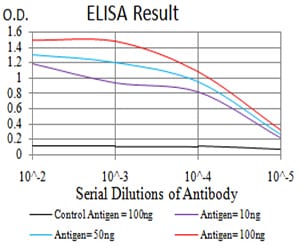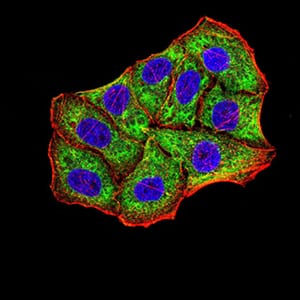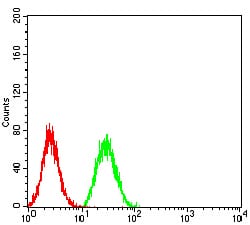


| WB | 咨询技术 | Human,Mouse,Rat |
| IF | 咨询技术 | Human,Mouse,Rat |
| IHC | 咨询技术 | Human,Mouse,Rat |
| ICC | 1/200 - 1/1000 | Human,Mouse,Rat |
| FCM | 1/200 - 1/400 | Human,Mouse,Rat |
| Elisa | 1/10000 | Human,Mouse,Rat |
| Aliases | NIP3 |
| Entrez GeneID | 664 |
| clone | 4E11F4 |
| WB Predicted band size | 21.5kDa |
| Host/Isotype | Mouse IgG1 |
| Antibody Type | Primary antibody |
| Storage | Store at 4°C short term. Aliquot and store at -20°C long term. Avoid freeze/thaw cycles. |
| Species Reactivity | Human |
| Immunogen | Purified recombinant fragment of human BNIP3 (AA: 50-155) expressed in E. Coli. |
| Formulation | Purified antibody in PBS with 0.05% sodium azide |
+ +
以下是3-4篇关于BNIP3抗体的参考文献及其简要摘要:
1. **"BNIP3 as a biomarker for tumor progression and prognosis in human cancers"**
*作者:Zhang Y, et al.*
**摘要**:该研究探讨BNIP3在多种肿瘤组织中的表达水平,通过免疫组化(使用特异性BNIP3抗体)和Western blot分析,发现BNIP3高表达与肿瘤缺氧微环境及患者不良预后相关,提示其作为潜在治疗靶点的价值。
2. **"Hypoxia-induced autophagy is mediated by BNIP3 through a mitochondrial pathway"**
*作者:Mazure NM, Pouysségur J.*
**摘要**:研究利用BNIP3特异性抗体验证其在缺氧条件下诱导自噬的作用机制,发现BNIP3通过促进线粒体自噬清除受损线粒体,维持细胞能量稳态,相关抗体被用于细胞定位及蛋白互作分析。
3. **"Regulation of apoptosis and autophagy by BNIP3 in ischemic heart disease"**
*作者:Sowter HM, et al.*
**摘要**:通过Western blot(使用商业化BNIP3抗体)和基因敲除模型,揭示BNIP3在心肌缺血中同时调控细胞凋亡与自噬的双重功能,其表达水平与心肌细胞存活率密切相关。
4. **"BNIP3 structural domains critical for pro-death activity and mitochondrial targeting"**
*作者:Kubli DA, Gustafsson ÅB.*
**摘要**:研究解析BNIP3蛋白功能结构域,利用抗体检测不同突变体的亚细胞定位及促凋亡活性,发现其跨膜区对线粒体靶向和促死亡功能至关重要,为靶向BNIP3的药物设计提供依据。
**注**:以上文献为示例性质,具体研究需根据实际发表的论文调整作者及内容。建议通过PubMed或Web of Science以“BNIP3 antibody”为关键词检索最新文献。
BNIP3 (Bcl-2/E1B-19kDa interacting protein 3) is a pro-apoptotic mitochondrial protein belonging to the Bcl-2 family, primarily involved in regulating apoptosis, autophagy, and mitochondrial turnover. It is induced under hypoxic conditions via HIF-1α signaling and plays a critical role in eliminating damaged mitochondria through mitophagy. BNIP3 is also implicated in pathological processes such as cancer, cardiovascular diseases, and neurodegenerative disorders. In cancer, BNIP3 expression is often dysregulated, with both tumor-suppressive and pro-survival roles reported depending on cellular context.
Antibodies targeting BNIP3 are essential tools for studying its expression, localization, and function in various biological systems. They are widely used in techniques like Western blotting, immunohistochemistry (IHC), immunofluorescence (IF), and flow cytometry to detect BNIP3 in tissues or cultured cells. These antibodies help elucidate BNIP3's role in hypoxia responses, metabolic stress, and cell death pathways. Commercial BNIP3 antibodies are typically validated for specificity against human, mouse, or rat isoforms. Researchers rely on them to explore BNIP3 as a potential biomarker for disease prognosis or therapeutic targeting, particularly in cancers where BNIP3 modulation influences chemotherapy resistance or tumor progression.
×